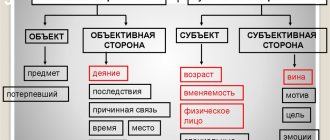According to Russian criminal law, the main participants in the crime committed, along with its perpetrator, can be recognized as organizers, instigators and accomplices, who are also liable in accordance with Article 33 of the Criminal Code of the Russian Federation. Incitement and incitement are also synonymous concepts for which criminal penalties are provided.
In legal terms, incitement to commit a crime according to the articles of the Criminal Code of the Russian Federation is inducing another adult or minor to commit crimes or offenses through persuasion, bribery with money, as well as threats or blackmail, and other forms of pressure.
The most popular cases of incitement
Incitement to commit a crime under Article 33 of the Criminal Code of the Russian Federation is most often committed in the form of monetary bribery and is one of the most difficult acts to prove in criminal law. Incitement is often an element of complex crimes in which there is a clear distribution of roles - organizer, perpetrator, accomplice, accomplice.
Incitement is expressed in putting pressure on a person who, according to the plan of the organizer, should become the perpetrator of a crime. Instigators are required to put pressure on a person to:
- murders, suicides;
- committing theft, robbery or kidnapping;
- transfer of important confidential information.
Important!
The role of instigator and accomplice in criminal law may be similar, but the accomplice implements recommendations for committing a crime, and also gives advice on providing an alibi and professionally covering up the traces of a crime. The instigator organizes the occurrence of events in which the performer will be forced to give consent to commit illegal actions.
Instigation, organization and aiding
Sometimes it is very difficult to distinguish incitement from organization or complicity. The fact is that some of the signs of these acts are very similar. An example can be given of intellectual complicity, when an accomplice has a psychological influence on the perpetrator of the crime. With this, he can help the would-be killer develop a plan and gives him the confidence to break the law with impunity.
Note!
The accomplice and the instigator perform different functions. The first advises and recommends how to act in various situations, provides the perpetrator with as much information as possible to facilitate the commission of the crime. The instigator creates the conditions in which the future murderer will have to agree to commit a crime.
When a person’s actions are considered as aiding or organizing a crime, Art. 33 of the Criminal Code of the Russian Federation is not used. Functions that can be performed in aiding and organizing murder:
- assistance in preparation, selection of assistants, means and instruments of crime. The organizer can find the weapon with which the attack will be carried out;
- providing information to assist the perpetrator in committing the murder. These are advice and instructions on actions in the current situation;
- creating conditions under which nothing can interfere with the execution of the crime;
- promise or actual assistance in eliminating traces of a crime;
- personal participation in illegal activities.
To qualify a person’s actions, it is also important who acts as the performer. If it turns out to be a minor or a person who is not capable of bearing responsibility, then the case will not be considered under Art. 33 of the Criminal Code of the Russian Federation. The instigator himself will be considered the perpetrator of the murder, and the one who committed the illegal actions will be regarded as the instrument of the crime. In other words, incitement in this case is qualified as taking advantage of the impunity of the perpetrator.
The main types of punishment for incitement to murder or suicide
Incitement to murder under the article of the Criminal Code of the Russian Federation is one of the most serious crimes; liability for it is determined in accordance with the main provisions of Art. 33 of the Criminal Code of the Russian Federation. The offender can either independently convey his own will or use assistance from both adult and minor accomplices in the commission of a crime. According to the law, the actions of an instigator can be reclassified under Article 105 of the Criminal Code of the Russian Federation, and a sentence will be imposed as one of the accomplices in its commission. The main methods here can be:
- making requests and persuasion;
- intentionally misleading a person regarding motives;
- committing monetary bribery;
- threats of causing trouble or harm to people close to you;
- blackmail;
- brute physical strength;
- carrying out provocation to commit an offense, where the main task is to expose the perpetrator.
Incitement to suicide under the article of the Criminal Code is also criminally punishable, and for its commission, if a crime is identified, punishment is provided by imprisonment for a term of up to 4 years, forced labor for up to 3 years, deprivation of the right to hold a position or engage in certain types of activities . Incitement to suicide committed through persuasion, proposals, bribery or deception may entail restriction of freedom for up to 3 years.
If the responsibility for incitement involves receiving advice, instructions, as well as providing all the necessary information, selecting means or instruments for committing suicide, or helping to remove obstacles, then according to the law, this is punishable by a prison term of up to 4 years.
How is punishment determined?
By itself Art. 33 of the Criminal Code of the Russian Federation does not contain sanctions for one or another type of complicity in a crime; incitement is qualified under one of the articles of the Special Part of the Criminal Code of the Russian Federation, which provides for liability for an already committed criminal act.
In accordance with Part 1 of Art. 34 of the Criminal Code of the Russian Federation, when determining the degree of responsibility of each of the participants in the crime, the volume and nature of their actions are taken into account. In other words, the investigation must establish what role was assigned to each group member and what actions each of them performed.
If the investigation establishes the fact of incitement by one of the group members, this participant will suffer a more severe punishment than other accomplices in the crime. Thus, for the same crime, different sanctions are applied to each accused. For example, according to Part 2 of Art. 105 the accused faces a sentence of imprisonment from eight to twenty years, and in some cases - life imprisonment. If such a crime is committed by several persons, each of them faces imprisonment, but with a different term of serving the sentence.
When determining the punishment for each participant in a criminal act, the recommendations provided for in Art. 67 of the Criminal Code of the Russian Federation, according to which punishment for a criminal act committed in complicity is imposed taking into account the following relevant conditions:
- the actual scope of actions of each participant in the commission of a criminal act;
- the consequences of such actions;
- presence (absence) of aggravating or mitigating circumstances.
Responsibility for a bribe
The Criminal Code of the Russian Federation for incitement to give a bribe, where the citizen acts as a formal intermediary, provides for the following types of punishment:
- a fine reaching 500 thousand rubles, three or five times the size of the bribe;
- forced labor for up to a year;
- correctional labor for up to 2 years;
- deprivation of the right to hold positions in certain areas for up to 5 years.
If responsibility for incitement is provided within a group where everyone has been assigned their own role, the punishment can be harsher - fines of up to 4 million rubles are provided, as well as the possibility of imprisonment for a term of 7 to 12 years. All capable citizens over the age of 16 are subject to liability. There are all the signs of an offense being committed if at least part of the bribe was handed over in front of witnesses.
The punishment can be eased by admitting one’s own guilt, assistance in the investigation, as well as sincere repentance for the crime committed and the citizen’s absence of previous convictions, as well as the presence of young children.
| Pass during quarantine | Payment and registration of sick leave during quarantine |
| Article 6.3 of the Code of Administrative Offenses | Article for violating the self-isolation regime |
- Didn't find the answer to your question? Find out how to solve exactly your problem - call right now:
- Federal number -
- Moscow region, Moscow -
- Leningr. region, St. Petersburg -
- It's absolutely free and fast!
Criminal Code of the Russian Federation Article 33. Types of accomplices in a crime.
Incitement is one of the types of complicity in a crime. According to Article 33 of the Criminal Code of the Russian Federation, there are four forms of assistance in the commission of a criminal act.
In addition to instigators, criminal law distinguishes organizers and accomplices. Moreover, each form of participation has its own characteristic features.
Responsibility for incitement is determined by a specific article of the Special Part of the Criminal Code of the Russian Federation.
An organizer is a citizen who directly organizes a criminal act, coordinating the actions of other participants, as well as a person who creates an organized group of persons, or an association of criminal groups for the purpose of committing crimes.
An accomplice is a citizen who assists in the commission of a criminal act through the following actions:
- giving advice and guidance;
- provision of information, means and tools necessary to commit a future crime;
- removing obstacles that prevent the commission of a criminal act;
- concealment of instruments and means used in the commission of a crime, persons involved in it, as well as stolen property of victims.
The perpetrator is a person who directly committed a criminal act alone or as part of a group of other perpetrators, as well as a citizen who committed a crime through the hands of persons exempted from liability by force of law, for example, by involving minors or incompetent citizens.
And finally, instigators are citizens who induce other persons to commit a criminal act by manipulating people through bribery, persuasion, threats, or using other methods of influencing a person.
In this case, the instigator can act through both soft intrusive persuasion, gradually convincing a person or misleading him, and harsh methods of influence, including physical violence, the threat of violence or blackmail.
The instigator’s choice of one method or another largely depends on the personality of his victim, her psychological state and life circumstances.
In some cases, it is quite difficult to distinguish between incitement, complicity and organization, since all these forms of participation in a crime have similar characteristics and pursue the same goal.
However, regardless of the degree of participation in the criminal act, these persons are accomplices of the crime committed.
The legislation clearly treats this form of participation as a criminal offense. The established fact of incitement in 2019 is qualified as a criminal offense committed by a group of citizens by prior conspiracy.
Even if there are two participants in a crime, a group is formed if the conditions provided for in Part 3 of Article 35 of the Criminal Code of the Russian Federation are met, namely: if these are citizens from among the permanent members of the group who have united in advance for the purpose of committing a crime.
In this case, a citizen who persuaded another person to commit a crime is liable for incitement on an equal basis with the direct perpetrator, even if the crime was committed without his participation.
2 of this criminal law (murder committed by an organized group by prior conspiracy) with reference to Art. 33 of the Criminal Code of the Russian Federation.
In the practice of investigative authorities, the likelihood of bringing a citizen to justice for incitement is low, since it is quite difficult to prove this fact.
For example, prosecute an instigator under an article that provides for liability for inducing another person to commit suicide. To bring charges, it is necessary to collect good evidence.
In this case, witness testimony may not be enough.
Any documentary evidence, as well as audio and video recordings of negotiations with future participants in the crime, including recordings of persuasion, threats or blackmail, are accepted as evidence of the instigator’s guilt.
Important! If it is impossible to prove the fact of incitement, Article 33 of the Criminal Code of the Russian Federation does not apply to the person who took part in the commission of a criminal act, which entails fewer legal consequences for him than complicity with incitement to a crime.
By itself Art. 33 of the Criminal Code of the Russian Federation does not contain sanctions for one or another type of complicity in a crime; incitement is qualified under one of the articles of the Special Part of the Criminal Code of the Russian Federation, which provides for liability for an already committed criminal act.
In accordance with Part 1 of Art. 34 of the Criminal Code of the Russian Federation, when determining the degree of responsibility of each of the participants in the crime, the volume and nature of their actions are taken into account. In other words, the investigation must establish what role was assigned to each group member and what actions each of them performed.
If the investigation establishes the fact of incitement by one of the group members, this participant will suffer a more severe punishment than other accomplices in the crime. Thus, for the same crime, different sanctions are applied to each accused.
For example, according to Part 2 of Art. 105 the accused faces a sentence of imprisonment from eight to twenty years, and in some cases - life imprisonment.
When determining the punishment for each participant in a criminal act, the recommendations provided for in Art. 67 of the Criminal Code of the Russian Federation, according to which punishment for a criminal act committed in complicity is imposed taking into account the following relevant conditions:
- the actual scope of actions of each participant in the commission of a criminal act;
- the consequences of such actions;
- presence (absence) of aggravating or mitigating circumstances.
Due to the fact that inducing a person to commit a particular criminal act often leads to serious consequences, in some cases such actions are considered as a separate completed crime, which has its own characteristics.
Such crimes include the following:
- involvement of persons under the age of majority in the commission of a crime, for example, in a fight or hooliganism;
- facilitating activities related to terrorism;
- inducing citizens to use drugs and illegal psychotropic substances;
- involvement in prostitution;
- organization of extremist activities.
Participation in this type of activity is considered as an independent criminal act and is punished in accordance with the sanctions provided for by the legal norms of the Criminal Code of the Russian Federation for each individual crime.
Currently, incitement is acquiring new socially dangerous forms. At the same time, not only society, but also the most vulnerable categories of its citizens suffer from such actions.
A large number of minor children who actively join dubious groups and communities on social networks become victims of instigators.
To date, there are no provisions in criminal law that would provide for liability for incitement online.
However, the need to introduce such responsibility is actively discussed in the sphere of legislative activity of our country.
Attention! The information in this article may be out of date! To clarify the information, fill out the application below and a qualified lawyer will help solve your problem or call the numbers listed on the website. Free consultation or call!
AUDIO VERSION OF THE ARTICLE
Author: Nekoz Arkady Sergeevich. Article viewed: once. Nekoz A. Chita, April
Article 33 of the Criminal Code, in addition to complicity, identifies several other types of involvement in a crime:
- execution - a person commits certain illegal actions aimed at fulfilling a criminal intent independently or through other participants;
- organization - coordinating the actions of group members, distributing roles, developing a plan, etc.;
- incitement - involving other persons in criminal activities in various ways: offering a share of the stolen property, persuasion, threats, etc.;
- complicity - organizing assistance in committing a crime through advice, recommendations and other means.
Complicity is somewhat different from other forms of complicity in that it has the smallest role directly in fulfilling the objective side, i.e. an accomplice can only know that a crime is being committed and not consciously resist its commission due to receiving a certain benefit.
The organizer is the main figure of the crime, whose tasks include creating a group, organizing an illegal act and leading the perpetrators.
As a rule, he will be the one who will bear the greatest responsibility.
The organizer may receive an even more severe punishment than the performer.
An instigator is a person who persuaded another citizen to commit criminal acts.
- Moreover, it can be written, oral, including using gestures.
- The promise to hide the attacker, means, instruments of assault, traces, objects that were obtained illegally, to acquire or sell them, in accordance with the law, are considered as independent methods of intellectual assistance only when given in advance.
- The changes provide for criminal liability for driving a car, tram or other mechanical vehicle by a person who is intoxicated, subjected to administrative punishment for driving while intoxicated or for failure to comply with the legal requirement of an authorized official to undergo a medical examination for intoxication or having a criminal record for intoxication. committing a crime provided for in parts 2, 4 or 6 of Article 264 or Article 264. A draft state or municipal contract is developed by the state or municipal customer and sent to the supplier (performer), unless otherwise provided by agreement between them. The party that received the draft state or municipal contract, no later than thirty days, signs it and returns one copy of the state or municipal contract to the other party, and if there are disagreements on the terms of the state or municipal contract, within the same period draws up a protocol of disagreements and sends it along with the signed state or a municipal contract to the other party or notifies it of refusal to conclude a state or municipal contract.
- In connection with the adoption of Federal Law No. 528-FZ of December 31, 2014 “On amendments to certain legislative acts of the Russian Federation on the issue of increasing liability for committing offenses in the field of road safety”, changes to the Criminal Code of the Russian Federation come into force on July 1, 2015 Federation, the Criminal Procedure Code of the Russian Federation, the Code of the Russian Federation on Administrative Offences, regarding strengthening penalties for committing offenses of driving a vehicle while a driver is intoxicated.
- These signs include: Modern legal science identifies several types and varieties of recidivism. 18 of the Criminal Code of the Russian Federation) Incitement is one of the most difficult forms of complicity in a crime to prove.
- In accordance with the current legislation (Article. In practice, it is possible to bring an instigator to justice only if there is direct evidence, such as an audio or video recording of a conversation.
- This article describes in detail what punishment awaits the instigator if he is caught and how his actions will be classified.
- That is, he directly commits illegal actions, for example, robbing a store.








